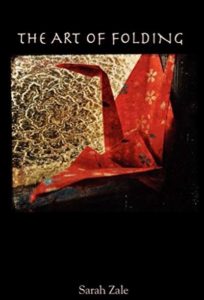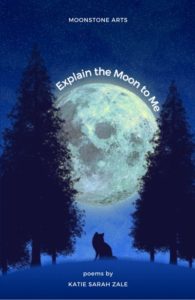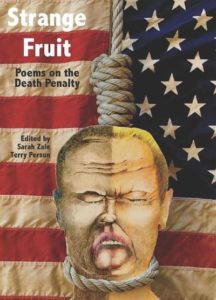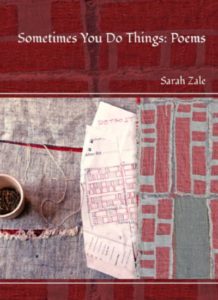BOOKS
The Weight of a Leaf
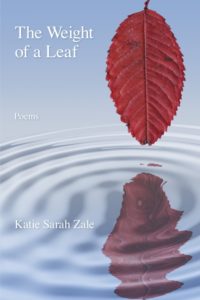
No other living poet extends the work of Sam Hamill like Katie Sarah Zale. The depth of feeling (often elegiac) and the fierce commitment to justice (gender, environmental and societal). There aren’t enough poems like this in the world. – Paul E Nelson, A Time Before Slaughter, Founder: Cascadia Poetics Lab, Literary Executor for Sam Hamill
“What is there to do about all the violence?” asks Zale in her opening poem “Bread,” setting the tone of this weighty collection. But there is lightness too, the weight of a leaf falling in the face of grief. It is the hopeful lightness that helps us to cope with all the darkness … it is especially the light touch of the poet’s lyrical precision that makes these poems so memorable. Describing the last hanging in Michigan, Zale writes, “I am the twisted neck and rise and fall of final breaths,” but I am also “the ink that changes the law … a voice protesting … a flower unfolding.” – Gene Twaronite, The Museum of Unwearable Shoes and Shopping Cart Dreams
Her poems reach into the violence of our times and shine a tender spotlight on nature, paving the way for us to find resilience by seeking truth. — Sheila Bender, Since Then: Poems and Short Prose
An unflinching look at the world without judgment: what we notice, what we pass by, what we hear … what we wonder about — “sunflowers / lying dead in Ukraine.” Katie writes with beautiful imagery and music and invites us to gather our own words. In “September 24, 1830: The Last Hanging in Michigan,” each line begins with “I am.” If we speak up and say what kind of person we are, we answer the question. This is a brave book. – Eleanor Kedney, Between the Earth and Sky
A resonance of peril energizes these poems … The Weight of a Leaf is the weight of what is written to testify and celebrate … the struggle to affirm that all lives matter. – Carolyne Wright, Pablo Neruda and Blue Lynx Prizes, American Book Award, Pushcart Prize
The Art of Folding
In these two major suites of poems, Sarah Zale has composed an epic, an eye-opening, heartrending book that should be read and read again. Hers is a singular and gently courageous voice, one from which we may all draw sustenance and wisdom. – Sam Hamill
Sarah Zale’s first book, The Art of Folding, is worthy of significant notice: her poetic sequence examines our personal responsibilities in a time of war and our relationship to atrocity. She softens the hard line of inquiry with compassionate listening and attentive observation. – H.K. Hummel
Sarah Zale’s The Art of Folding is a masterful work of sustained and interwoven lyrics, at once political and intimate, in which the gestures of daily life are seen as if for the first time in the light of history: folding and unfolding ordinary laundry and something more-cranes, folded and real, wounds, visible and invisible. What we have here is sheer lyric utterance: history and memory, personal disclosure, in a language at once compelling and transparent. These poems are haunted by Nuremberg, Spencer Tracy and Marlene Dietrich, the Wizard of Oz, Camelot, Jerusalem, and there is also Palestine. This poet writes back to Jabs, Siamanto, Amichai and Darwish, and calls forth a most ancient and moral imperative: that poets write of their time, and of the call to the best of humanity. That she struggles toward the boundary between Israel and Palestine is a mark of her seriousness. That she achieves this is a mark of her power. – Carolyn Forché
Sarah Zale has written a book of hauntingly straightforward and stark, yet inviting poems. Her unique voice and music will captivate you, her images draw you in from the beginning shirt, ironing, hair , as this important and necessary book gains momentum with each poem. – Martha Silano
Explain the Moon To Me
Explain the Moon to Me grounds the reader firmly on this planet despite its celestial title. With a “moon” in each poem, Zale explores themes of aching separation and loss, brokenness and persistence, and poignant humanity, among others. Her poems are filled with rich language, deep emotion, and honed imagery that keep the reader fully engaged. In this well-crafted work, Zale reminds us to watch for “blue flashes and green on the horizon” of hope. – Alan Perry
Katie Sarah Zale has put together an amazing collection of poems into which, among other things, the moon keeps creeping. It appears as an egg placed on the windowsill of a jail cell, in another as “A parenthesis, / the afterthought of something always missing / from the conversation.” In a variety of forms, these well-crafted poems cover subjects as diverse as her dog, Emma, and her brother in prison, with compassion, insight, and poignancy. Most striking is her deft use of nature imagery and metaphor to elucidate human experiences, relationships, and what we do to the world—and each other. – Bonnie Wehle
Explain the Moon to Me ponders the known and unknown. These poems employ nature, sound, and human consequence(s) to highlight human failure and beauty. Zale does what poets do… show us the moon. Allia Abdullah-Matta
Strange Fruit: Poems on the Death Penalty
This anthology was inspired by efforts to abolish Washington State’s death penalty by using the power of poetry. The poems were chosen for their intention to evoke empathy, to open minds and hearts to the fate of individuals on death row and the individuals directly affected by their crimes. Poets from around the United States address the sentiment in Bryan Stevenson’s book Just Mercy: A Story of Justice and Redemption: “The death penalty is not about whether people deserve to die for the crimes they commit. The real question of capital punishment in this country is, do we deserve to kill?”
Poet and author of Instrument of Gaps, Felicia Zamora, writes, “…when the scales we turn to for justice are weighed down and sagging, there is no longer a possibility of balance. It becomes our responsibility to call our laws into question, to demand change. We must acknowledge the words of the dying, ‘I am human. I am a human being.’ We all are human beings, and this book cries out for this to be heard. This book asks each of us to not turn our heads.”
Mike Farrell, best known as BJ Hunnicutt of M*A*S*H and president of the board of Death Penalty Focus, an abolition organization based in California, writes, “…in Strange Fruit, the complex web of emotions capital punishment evokes is beautifully rendered. It’s an emotional journey that will remind you with each step the urgent need to abolish this horror once and for all.”
Contributors: Norma Bishop, Summer Brenner, Sharon M. Carter, Henry Crawford, Nancy Fowler, Ed Harkness, Sally Hedges-Blanquez, Esther Altshul Helfgott, Christopher Herold, Diane Kendig, Raechl Kynor, Adria L. Libolt, William Mawhinney, James Murphy, Paul E Nelson, Terry Persun, Anne Sandor, Sarah Sarai, Lauren Scharhag, Alan Semerdjian, Mark Valentine, Deborah Wiese, Anne Harding Woodworth, and Katie Sarah Zale.
Sometimes You Do Things
Some poets write with such clarity of eye that reading their work is like paging through a scrapbook of their experience. Sarah Zale is such a poet. This is a writer who has ‘seen a lot of dying,’ but who understands that ‘sometimes you do things’ because there is no other human alternative. Ultimately, Zale graces us with the battered but never defeated lives captured in her words. – John Jeffire, Motown Burning
In this gracefully passionate collection of poems about Detroit, Sarah Zale has plumed the hard-worked yet strongly beating heart of my beloved birthplace. Detroit, mythical and real, is emblematic of all that is both great and grim about America: her history, devastation, and hope. “Detroit is still burning” says one of the poems, and Zale¹s poems burn with the fire of love for justice, compassion, and the on-going struggle. – Judith Roche, Wisdom of the Body
The poems of Sarah Zale are rooted in reality and exude moral elegance. Through rhythms of memory, of factories, of reclaimed streets, she marvelously turns old fires into new light. – Linda Andrews, Escape of the Bird Women
Click on book tittles to order!
